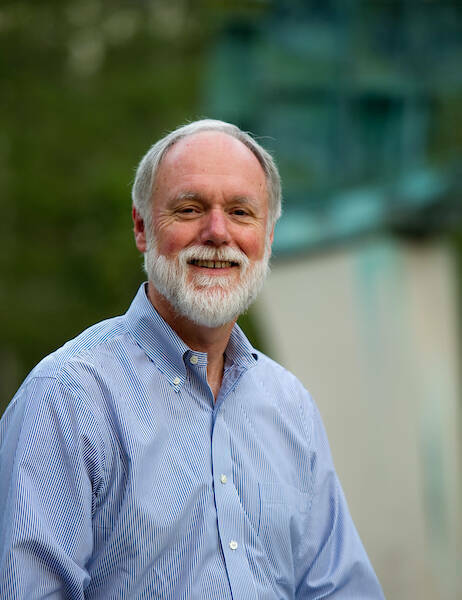Peter Easton testifies in ongoing trial of FTX founder Sam Bankman-Fried

University of Notre Dame Accountancy Professor Peter Easton on Wednesday (Oct. 18) testified in Manhattan federal court in one of the largest fraud cases in the history of the United States — the trial of disgraced FTX founder Sam Bankman-Fried, now in its third week.
Bankman-Fried, who says he never intended to defraud customers, has pleaded not guilty to two counts of fraud and five counts of conspiracy. Prosecutors say he looted billions of dollars in FTX customer funds.
Easton, who previously worked on other high profile cases including Enron, WorldCom and Parmalaat, was hired by the U.S. Department of Justice to provide a detailed analysis of the exchange of billions of dollars between FTX and its sister hedge fund, Alameda Research. He examined whether balances in actual bank accounts matched those in FTX’s internal ledgers in an effort to explain what happened to $9 billion in FTX customer funds missing in June 2022, months before the company filed for bankruptcy.
The director of the Center for Accounting Research and Education and the Notre Dame Alumni Professor of Accountancy at the Mendoza College of Business, Easton specializes in corporate valuation and financial statement analysis. He told the court, “I teach, essentially, penetrating financial statements.”
When asked if his analysis showed the use of customer funds, Easton said, “Oh yes.”
During his extensive testimony, Easton revealed the amount in Alameda Research and FTX’s accounts was far less than what was owed to customers of FTX. He found that $11.3 billion in FTX customer funds should have been held at Alameda, but only $2.3 billion were actually in its bank accounts and that Alameda used the assets for its own expenditures.
Easton said, “Customer funds were used in various ways,” including investments, political contributions, charity foundations and real estate purchases, backing prosecutors’ claims that Bankman-Fried funneled money from his FTX customers into Alameda for those purposes.
Using numerous charts and graphs he created, Easton showed that more than $400 million of customer funds were sent to hedge fund Modulo Capital. He said, “It is only customer funds. It did not come from anywhere else.”
He also traced $70 million of investor funds in real estate throughout the Bahamas, including Bankman-Fried’s luxury penthouse, and showed that millions of dollars in customer funds from FTX’s exchange was donated to a super PAC benefiting Democrats. He showed that a large sum of customer funds went to Modulo Capital through an investment made by Alameda and said FTX customers’ crypto assets were used to help repay a loan Alameda received from Genesis Capital.
The defense is set to begin presenting its case on Oct. 26 (Thursday). Bankman-Fried faces decades in prison if convicted.
Latest Faculty & Staff
- Notre Dame’s Fightin’ Irish Battalion receives Department of Defense award as nation’s top Army ROTC programThe United States Department of Defense honored the University of Notre Dame’s Army ROTC Fightin’ Irish Battalion as the nation’s top Army collegiate program for the 2023-24 academic year. This will be the first time the unit has received the department’s Educational Institution Partnership Excellence Award, which recognizes the program’s achievements in recruiting, educating, training and commissioning leaders of character to be the next generation of military officers.
- In memoriam: Karl Ameriks, the McMahon-Hank Professor of Philosophy EmeritusKarl Ameriks, the McMahon-Hank Professor of Philosophy Emeritus at the University of Notre Dame, died on April 28 from pancreatic cancer. He was 77. Born in post-World War II Germany, Ameriks’ family emigrated to the United States when he was a child, and he grew up in Detroit, Michigan. He received his bachelor’s and doctoral degrees from Yale University. He came to the Department of Philosophy at Notre Dame in 1973 during a formative time for the department, which had transitioned from a predominantly Thomist focus to the more analytical American philosophy in the 1960s.
- Notre Dame psychologist explores how children best learn math — and yes, timed practice helpsUniversity of Notre Dame professor of psychology Nicole McNeil recently co-authored a report that examines the best way for children to learn arithmetic — whether that’s by memorizing number values and multiplication tables, or by studying math at a deeper, conceptual level. The report, “What the Science of Learning Teaches Us About Arithmetic Fluency,” was published in the journal Psychological Science in the Public Interest and shows that children learn most effectively when instruction follows an evidence‑based cycle: grounding facts in conceptual understanding, using brief timed practice to make those facts automatic, and then returning to discussion and reflection to deepen that knowledge.
- ’Tis the season for ticks and mosquitoes. A medical entomologist talks about these pests and how to avoid them.Notre Dame expert Lee Haines explains the risks mosquitoes and ticks pose to the Midwest and discusses how the public can best protect themselves and family members (including pets) from these bloodthirsty pests.
- ND Expert on tariffs and trade policy: ‘How should the US be engaged with the rest of the world?’To make sense of the new administration's recent tariff announcements and policy changes, Robert Johnson, the Brian and Jeannelle Brady Associate Professor of Economics at Notre Dame, explains how tariffs affect global economies and what this means for U.S. engagement in global trade.
- In memoriam: W. David Solomon, founding director of the Center for Ethics and CultureW. David Solomon, associate professor of philosophy emeritus and founding director of the de Nicola Center for Ethics and Culture at the University of Notre Dame, died on February 26, 2025. He was 81.












